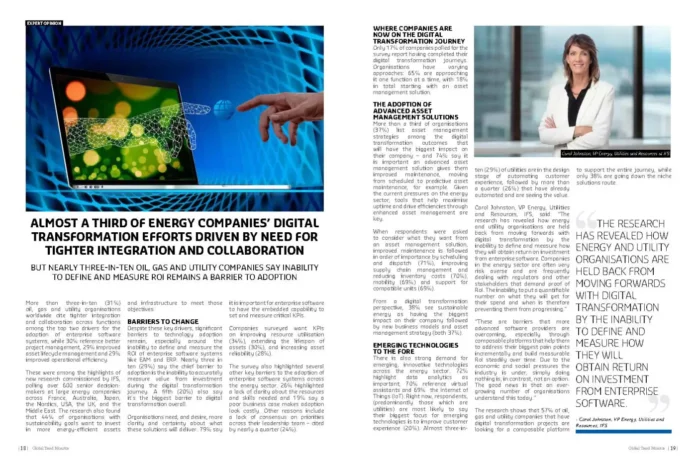But nearly three-in-ten oil, gas and utility companies say inability to define and measure ROI remains a barrier to adoption
More than three-in-ten (31%) oil, gas and utility organisations worldwide cite tighter integration and collaboration across functions among the top two drivers for the adoption of enterprise software systems, while 30% reference better project management, 29% improved asset lifecycle management and 29% improved operational efficiency.
These were among the highlights of new research commissioned by IFS, polling over 600 senior decision-makers at large energy companies across France, Australia, Japan, the Nordics, USA, the UK, and the Middle East. The research also found that 44% of organisations with sustainability goals want to invest in more energy-efficient assets and infrastructure to meet those objectives.
Barriers to change
Despite these key drivers, significant barriers to technology adoption remain, especially around the inability to define and measure the ROI of enterprise software systems like EAM and ERP. Nearly three in ten (29%) say the chief barrier to adoption is the inability to accurately measure value from investment during the digital transformation journey. A fifth (20%) also say it’s the biggest barrier to digital transformation overall.
Organisations need, and desire, more clarity and certainty about what these solutions will deliver. 79% say it is important for enterprise software to have the embedded capability to set and measure critical KPIs. Companies surveyed want KPIs on improving resource utilisation (34%), extending the lifespan of assets (30%), and increasing asset reliability (28%).
The survey also highlighted several other key barriers to the adoption of enterprise software systems across the energy sector. 26% highlighted a lack of clarity about the resources and skills needed and
19% say a poor business case makes adoption look costly. Other reasons include a lack of consensus on priorities across their leadership team – cited by nearly a quarter (24%).
Where companies are now on the digital transformation journey
Only 17% of companies polled for the survey report having completed their digital transformation journeys. Organisations have varying approaches: 65% are approaching it one function at a time, with 18% in total starting with an asset management solution.
The adoption of advanced asset management solutions
More than a third of organisations (37%) list asset management strategies among the digital transformation outcomes that will have the biggest impact on their company – and 74% say it is important an advanced asset management solution gives them improved maintenance, moving from scheduled to predictive asset maintenance, for example. Given the current pressures on the energy sector, tools that help maximise uptime and drive efficiencies through enhanced asset management are key.
When respondents were asked to consider what they want from an asset management solution, improved maintenance is followed in order of importance by scheduling and dispatch (71%), improving supply chain management and reducing inventory costs (70%), mobility (69%) and support for compatible units (69%).
From a digital transformation perspective, 38% see sustainable energy as having the biggest impact on their company followed by new business models and asset management strategy (both 37%).
Emerging technologies to the fore
There is also strong demand for emerging, innovative technologies across the energy sector. 72% highlight data analytics as important; 70% reference virtual assistants and 69% the Internet of Things (IoT). Right now, respondents, (predominantly those which are utilities) are most likely to say their biggest focus for emerging technologies is to improve customer experience (20%). Almost three-in-ten (29%) of utilities are in the design stage of automating customer experience, followed by more than a quarter (26%) that have already automated and are seeing the value.
Carol Johnston, VP Energy, Utilities and Resources, IFS, said: “The research has revealed how energy and utility organisations are held back from moving forwards with digital transformation by the inability to define and measure how they will obtain return on investment from enterprise software. Companies in the energy sector are often very risk averse and are frequently dealing with regulators and other stakeholders that demand proof of RoI. The inability to put a quantifiable number on what they will get for their spend and when is therefore preventing them from progressing.”
“These are barriers that more advanced software providers are overcoming, especially through composable platforms that help them to address their biggest pain points incrementally and build measurable RoI steadily over time. Due to the economic and social pressures the industry is under, simply doing nothing is, in contrast, not an option. The good news is that an ever-growing number of organisations understand this today.”
The research shows that 57% of oil, gas and utility companies that have digital transformation projects are looking for a composable platform to support the entire journey, while only 38% are going down the niche solutions route.
